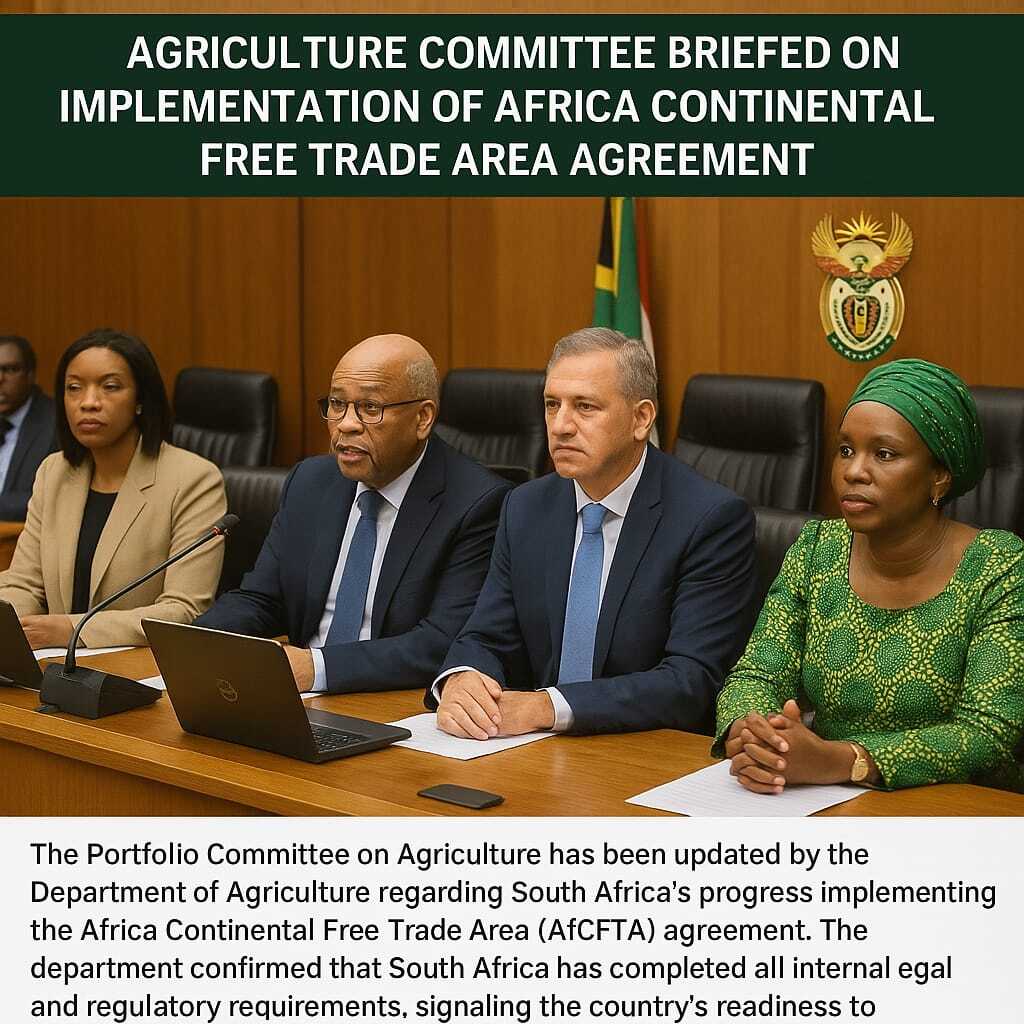Agriculture Committee Briefed on Implementation of Africa Continental Free Trade Area Agreement
The Portfolio Committee on Agriculture has been updated by the Department of Agriculture regarding South Africa’s progress in implementing the Africa Continental Free Trade Area (AfCFTA) agreement. The department confirmed that South Africa has completed all internal legal and regulatory requirements, signaling the country’s readiness to commence trade under AfCFTA.
AfCFTA and Its Implications
AfCFTA unites 55 African Union (AU) member states into a single market, aiming to boost intra-Africa trade by progressively eliminating trade barriers. The agreement, signed on March 21, 2018, in Kigali, Rwanda, is the world’s largest free trade area, covering a market of over 1.3 billion people.
While the implementation process across Africa remains slow due to ongoing legal and regulatory adjustments in various state parties, South Africa is well-prepared. It has joined the Guided Trade Initiative, a pilot program designed to test AfCFTA’s institutions and trading mechanisms. The first South African shipment under this initiative was sent to Ghana and Kenya in 2024.
South Africa’s Readiness and Progress
The Department of Agriculture informed the committee that of the 55 AU member states, 54 have signed the agreement (excluding Eritrea), 48 have ratified it, and 49 have submitted tariff offers covering 90% of the tariff book (Category A). The remaining offers are expected to be submitted by October 2025, paving the way for full-scale trade under AfCFTA.
To prepare the agricultural sector, the department has conducted industry workshops at regional, national, and provincial levels. The Agricultural Trade Forum (ATF) is being utilized to facilitate industry consultations and reporting. Additionally, the AfCFTA National Implementation Committee (NIC) has been established to monitor and guide South Africa’s participation.
Agriculture and Agro-processing Master Plan
The committee also received an update on the Agriculture and Agro-processing Master Plan, presented by Dr. Simphiwe Ngqangweni, CEO of the National Agricultural Marketing Council. Signed on May 12, 2022, this plan provides a strategic framework for inclusive growth, investments, sustainable job creation, transformation, and market development in alignment with South Africa’s National Development Plan (Chapter 6) and the Economic Reconstruction and Recovery Plan post-COVID-19.
Dr. Ngqangweni highlighted that the plan is a key tool for enhancing efficiency, transparency, and coordination in agricultural sector growth. The strategy aims to diversify exports and increase value-added agricultural product exports within Africa.
Key Committee Concerns
During the briefing, committee members raised several concerns:
- Support for small agro-processing enterprises: The committee sought clarity on how the government is assisting small businesses within the agro-processing sector.
- Low participation of black chicken farmers: Members emphasized the need for strategies to enhance black farmer involvement in the poultry industry.
- Promotion of goat farming for export: The committee encouraged the department to explore the expansion of goat farming to tap into potential markets in the Middle East and Africa.
With South Africa poised to fully engage in AfCFTA, stakeholders remain optimistic that the agreement will open up new opportunities for farmers, agro-processors, and exporters, fostering economic growth and development in the country’s agricultural sector.
